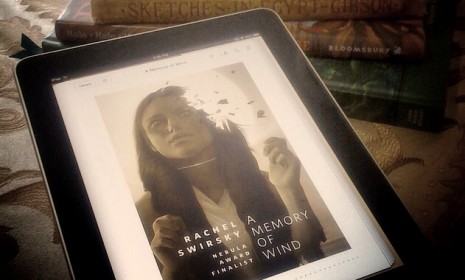Cheaper e-books: Where's the downside?
Amazon is dropping prices for e-books to as little as $9.99. For some, the move raises concerns that the discounts could decimate the rest of the publishing industry

A free daily email with the biggest news stories of the day – and the best features from TheWeek.com
You are now subscribed
Your newsletter sign-up was successful
The Department of Justice last week sued Apple and a cabal of book publishers for fixing higher prices for e-books. The government sided with Amazon, the maker of the Kindle e-reader, in concluding that Apple's deal unfairly drove up prices for customers. Amazon immediately announced that it would lower its e-book prices to as little as $9.99, from the previous basement of $14.99, ostensibly a huge victory for readers everywhere. But booksellers and publishers are warning that the bargain will have ugly consequences. Could cheaper e-books actually be a bad thing?
It could give Amazon a monopoly over e-books: "Amazon, already the dominant force in the industry, will hold all the cards," says David Streitfeld at The New York Times. Amazon is willing to "take a loss on every book it sells to gain market share for Kindle devices," a luxury unavailable to publishers and booksellers. Amazon's low prices will push prices down across the industry, while making physical books all the more unattractive price-wise. That could spell financial ruin for brick-and-mortar stores, including Barnes & Noble. The "ultimate effect" of the Department of Justice's suit "will be to exchange a perceived monopoly for a real one."
"Cut in e-book pricing by Amazon is set to shake rivals"
The Week
Escape your echo chamber. Get the facts behind the news, plus analysis from multiple perspectives.

Sign up for The Week's Free Newsletters
From our morning news briefing to a weekly Good News Newsletter, get the best of The Week delivered directly to your inbox.
From our morning news briefing to a weekly Good News Newsletter, get the best of The Week delivered directly to your inbox.
Publishers have only themselves to blame: Lower e-book prices will be a "boon to smaller publishers, authors, and — most importantly of all — readers," says Will Entrekin at The Huffington Post. Amazon rose to dominance by "innovating, advancing, and refining its business model to better serve its customers," while corporate publishers "clung to a business model despite innovations that could have helped lower their costs." Why didn't any of the publishers design their own e-readers or enhance their websites? It's their own fault if they didn't take advantage of new technologies.
"The DOJ antitrust lawsuit is good for e-book readers"
Apple's price-fixing actually helped fight monopoly: Apple is saying its deal with the publishers was necessary to break up Amazon's "monopolistic grip" on the industry, says Melissa Daniels at Mobiledia. Amazon's market share of the e-book industry used to be 90 percent, and has since fallen to 60 percent, which is evidence that Apple's price-fixing arrangement encourages more competition. "If Apple wins the case, it could mean such arrangements aren't considered a violation of antitrust laws but serve as a vehicle to keep one competitor from cornering the market."
"How Apple will defend itself in the e-book battle"
A free daily email with the biggest news stories of the day – and the best features from TheWeek.com
-
 Political cartoons for February 21
Political cartoons for February 21Cartoons Saturday’s political cartoons include consequences, secrets, and more
-
 Crisis in Cuba: a ‘golden opportunity’ for Washington?
Crisis in Cuba: a ‘golden opportunity’ for Washington?Talking Point The Trump administration is applying the pressure, and with Latin America swinging to the right, Havana is becoming more ‘politically isolated’
-
 5 thoroughly redacted cartoons about Pam Bondi protecting predators
5 thoroughly redacted cartoons about Pam Bondi protecting predatorsCartoons Artists take on the real victim, types of protection, and more